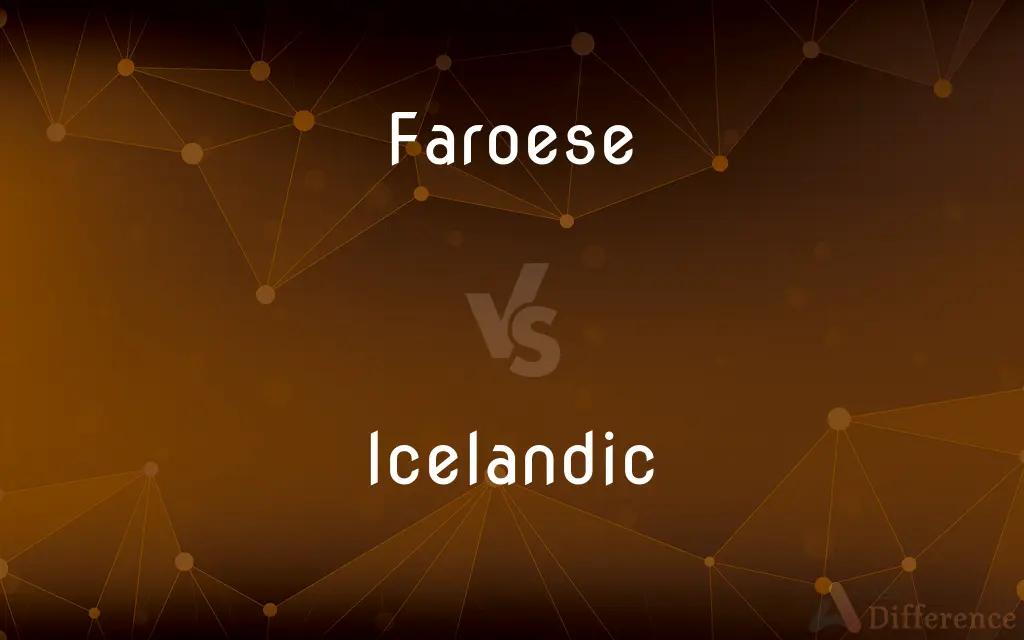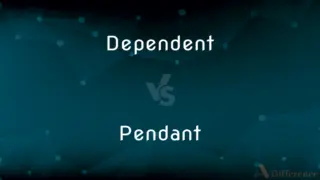Faroese vs. Icelandic — What's the Difference?
By Tayyaba Rehman & Urooj Arif — Updated on April 6, 2024
Faroese and Icelandic are both North Germanic languages, with Faroese spoken in the Faroe Islands and Icelandic in Iceland, whereas Icelandic is notable for its conservative grammar and vocabulary, maintaining significant similarity to Old Norse.

Difference Between Faroese and Icelandic
Table of Contents
ADVERTISEMENT
Key Differences
Faroese and Icelandic, while sharing a common Old Norse heritage, have evolved differently due to geographical isolation and historical influences. Faroese has undergone significant phonological changes and has adopted many loanwords, particularly from Danish, due to Denmark's historical dominance over the Faroe Islands. In contrast, Icelandic has preserved much of the grammar and vocabulary of Old Norse, making it one of the closest modern languages to the ancient language.
Faroese's evolution includes a simplification of the inflectional system compared to Old Norse, whereas Icelandic retains a complex system of noun declensions and verb conjugations, closely mirroring its medieval ancestor. This difference makes Icelandic grammar particularly challenging for learners but also serves as a living window into the linguistic past of the Norse people.
Pronunciation and spelling in Faroese have diverged more from Old Norse than Icelandic has. Faroese phonology is characterized by a number of sound changes, including diphthongization and the loss of certain consonant sounds, which are not found in Icelandic. Icelandic spelling, meanwhile, remains closely aligned with historical norms, reflecting the language’s conservative nature.
Despite their differences, both languages use the Latin alphabet, augmented with additional letters to represent specific phonetic sounds. Faroese and Icelandic are not mutually intelligible in spoken form, although there is some mutual intelligibility in written form due to shared vocabulary and grammatical structures.
Culturally, both languages play a crucial role in preserving the heritage of their respective peoples, with strong literary traditions that emphasize the importance of historical texts and folklore. Both societies regard their language as a key component of national identity and cultural continuity.
ADVERTISEMENT
Comparison Chart
Geographic Origin
Faroe Islands
Iceland
Phonology
Undergone significant changes; features diphthongs
Relatively conservative; closer to Old Norse
Grammar
Simplified inflectional system
Complex declensions and conjugations
Vocabulary
Many Danish loanwords
Maintains extensive Old Norse vocabulary
Spelling
Reflects phonological changes
Conservative, mirroring historical norms
Mutual Intelligibility
Limited, especially in spoken form
Limited, especially in spoken form
Cultural Role
Central to Faroese identity; modern and folk literature
Strong literary tradition; preservation of Norse heritage
Compare with Definitions
Faroese
A North Germanic language spoken in the Faroe Islands.
Faroese is taught in schools across the Faroe Islands.
Icelandic
A North Germanic language spoken in Iceland.
Icelandic has remained relatively unchanged since the medieval era.
Faroese
Contains many loanwords from Danish.
Modern Faroese vocabulary has been enriched by Danish influence.
Icelandic
Preserves Old Norse grammar and vocabulary.
Icelandic students study texts written centuries ago in their original language.
Faroese
Characterized by significant phonological changes from Old Norse.
Faroese phonology includes the use of diphthongs.
Icelandic
Spelling reflects historical phonology.
Icelandic spelling conventions are closely tied to its Old Norse roots.
Faroese
Uses a simplified grammatical structure.
Faroese grammar is less complex than that of its Old Norse ancestor.
Icelandic
Central to national identity and literary heritage.
The Sagas of Icelanders are an integral part of Icelandic culture.
Faroese
Reflects a unique island identity.
Faroese literature and folk songs are pivotal to the islands' culture.
Icelandic
Maintains a complex system of declensions and conjugations.
Icelandic grammar includes four cases for nouns.
Faroese
A member of the Scandinavian people inhabiting the Faroe Islands.
Icelandic
Of or relating to Iceland or its people, language, or culture.
Faroese
The North Germanic language spoken by the inhabitants of the Faroe Islands.
Icelandic
The North Germanic language of Iceland.
Faroese
An inhabitant, or, collectively, inhabitants, of the Faroe islands.
Icelandic
Of or pertaining to Iceland; relating to, or resembling, the Icelanders.
Faroese
A Scandinavian language (closely related to Icelandic) that is spoken on the Faroe Islands
Icelandic
The language of the Icelanders. It is one of the Scandinavian group, and is more nearly allied to the Old Norse than any other language now spoken.
Icelandic
A Scandinavian language that is the official language of Iceland
Icelandic
Of or relating to Iceland or its people or culture;
Icelandic ports
The Icelandic president is a woman
Icelandic sagas
Common Curiosities
Why has Faroese adopted many Danish words?
The adoption of Danish loanwords in Faroese is largely due to Denmark's historical influence over the Faroe Islands.
How is Icelandic related to Old Norse?
Icelandic has preserved much of the grammar and vocabulary of Old Norse, making it the closest modern language to the ancient Norse language.
How does Icelandic preserve its medieval heritage?
Through its conservative grammar, vocabulary, and spelling, Icelandic maintains a close connection to its medieval roots, allowing modern Icelanders to read ancient texts with relative ease.
What is Faroese?
Faroese is a North Germanic language spoken in the Faroe Islands, known for its unique phonological characteristics and Danish loanwords.
What role does language play in Faroese culture?
Language is central to Faroese identity, with a strong tradition of folk tales, songs, and modern literature reflecting the islands' unique culture.
How are new words formed in Icelandic?
Icelandic often creates new words through compounding and derivation from existing Icelandic or Old Norse roots, rather than adopting foreign loanwords.
What is the status of the Icelandic language today?
Icelandic is actively spoken by the majority of Iceland's population and is the subject of efforts to adapt it to modern technology and culture while preserving its historical features.
Can Faroese and Icelandic speakers understand each other?
While there is some mutual intelligibility in written form, Faroese and Icelandic speakers generally cannot understand each other in spoken form.
Is Faroese difficult to learn for non-natives?
Like many languages, Faroese presents challenges to learners, especially in its phonology and syntax, but it also shares grammatical and lexical similarities with other North Germanic languages.
How do Faroese and Icelandic compare in terms of literary output?
Both languages boast rich literary traditions; Icelandic is renowned for its medieval literature, while Faroese has a strong oral storytelling tradition and a growing body of written literature.
Share Your Discovery

Previous Comparison
Advice vs. Advisory
Next Comparison
Dependent vs. PendantAuthor Spotlight
Written by
Tayyaba RehmanTayyaba Rehman is a distinguished writer, currently serving as a primary contributor to askdifference.com. As a researcher in semantics and etymology, Tayyaba's passion for the complexity of languages and their distinctions has found a perfect home on the platform. Tayyaba delves into the intricacies of language, distinguishing between commonly confused words and phrases, thereby providing clarity for readers worldwide.
Co-written by
Urooj ArifUrooj is a skilled content writer at Ask Difference, known for her exceptional ability to simplify complex topics into engaging and informative content. With a passion for research and a flair for clear, concise writing, she consistently delivers articles that resonate with our diverse audience.














































